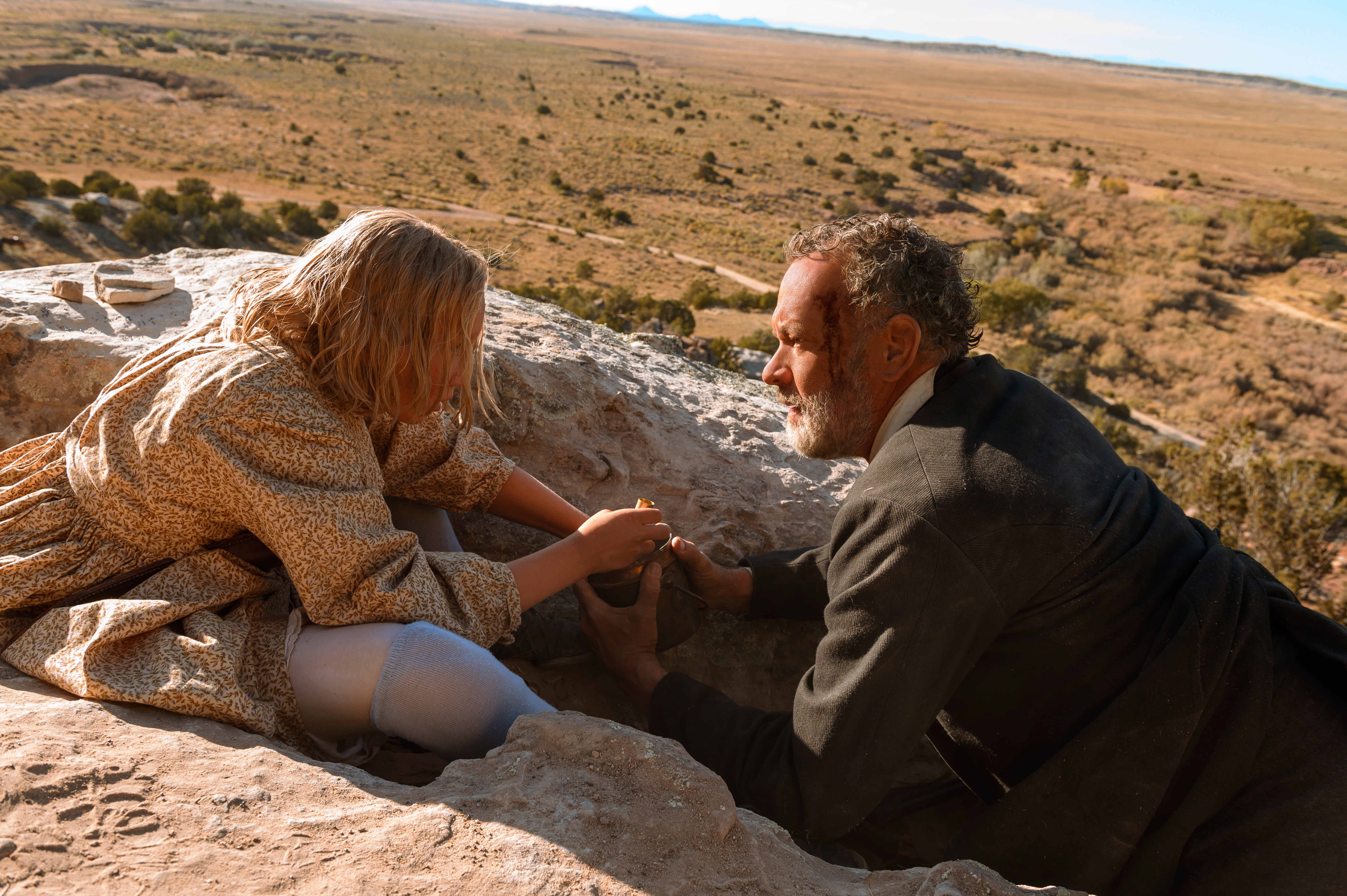News of the World review: Tom Hanks’s first western is a clumsy allegory for white guilt
It’s a handsome film, though its aim to rewrite the American myth falls short in several crucial ways
Dir: Paul Greengrass. Starring: Tom Hanks, Helena Zengel, Michael Covino, Fred Hechinger, Neil Sandilands, Thomas Francis Murphy. 12, 119 mins
It might shock you to learn that News of the World is Tom Hanks’s very first western. He seems such a natural fit for the genre – not just because he’s Toy Story’s Woody, but because there’s always been something so sturdy about him. He’s the human embodiment of a fleet of covered wagons rolling towards the promised lands of the West.
But the western is not what it used to be. In the mid-Sixties, Hollywood began to question the moral hollowness in the way the genre endorses the myths of America – all these tales of heroes taming a savage land, with no thought that it was never theirs to conquer. The western of today is dark and cynical, steeped in oppression and conflicted morality. But with News of the World, Paul Greengrass has attempted something different – to revisit the traditional western and pen a second, more worthy version of the American story. It’s a handsome film, though his aims fall short.
Adapted from Paulette Jiles’s 2016 novel, it casts Hanks as Captain Jefferson Kyle Kidd, a Confederate veteran in 1870, as he attempts to refashion some idea of normality out of the ashes of war. He did not believe in the ideals that he fought for, but still killed on their behalf – Greengrass and Luke Davies’s script never dives deep here, lest the implications become too thorny. Kidd now travels from town to town, reading out newspapers to local crowds. One day, he stumbles across a young girl (Helena Zengel), alone and afraid. Six years ago, raiders from the Kiowa tribe killed the girl’s family and raised her as their own. The whites then killed the Kiowa. Kidd makes it his duty to deliver her to an aunt and uncle on the other side of the state.
Their journey packs in all the usual thrills of the genre – the shootouts and the ravenous jaws of nature – though Greengrass doesn’t approach the material with the kineticism of Captain Phillips (also starring Hanks) or the Bourne films. This landscape is captured with a dutiful grandeur, all dusty vistas and the lonesome strings of James Newton Howard’s score. One shot directly calls back to the final seconds of John Ford’s The Searchers.

The girl, once known as Johanna, now Cicada, speaks only Kiowa. But Zengel, a stand-out in last year’s System Crasher, has a stare that could burn holes through steel. We don’t have to speak her language to know the depth of her feeling. And Hanks’s natural charms are particularly moving when collected into a quiet, unshowy desire to show empathy for his new ward – at one point, he asks if she can remember anything of her old family, only to spy an almost imperceptible shift in her expressions. He changes the subject immediately. He could sense the trauma starting to bubble up.
Greengrass believes that these two lost souls represent the heart of the nation – if they can heal and move forward together, so can a divided America. “The war’s over, we have to stop fighting,” Kidd preaches. There’s no doubt this call for unity is intended to echo through the ages – the director’s always been firmly entrenched in contemporary politics. One sequence even deals with a bigoted, exploitative mayor who spreads “fake news” to keep himself in power.
But it’s a clumsy allegory to make. Greengrass presents the end of the Civil War as an opportunity to move forward, in deliberate ignorance of the fact the Jim Crow laws would soon come into effect and that the US continued to massacre indigenous tribes throughout this period and into the 20th century. News of the World is only about unity in the context of white guilt and white desire for unearned closure. For all its attempts to re-examine how America should see itself, the film still seems unable to confront historical truth. Perhaps the old western should stay dead.
Join our commenting forum
Join thought-provoking conversations, follow other Independent readers and see their replies
Comments